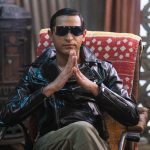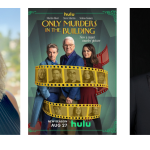WonderCon 2025 Interview: Legion M’s “Fade to Black”
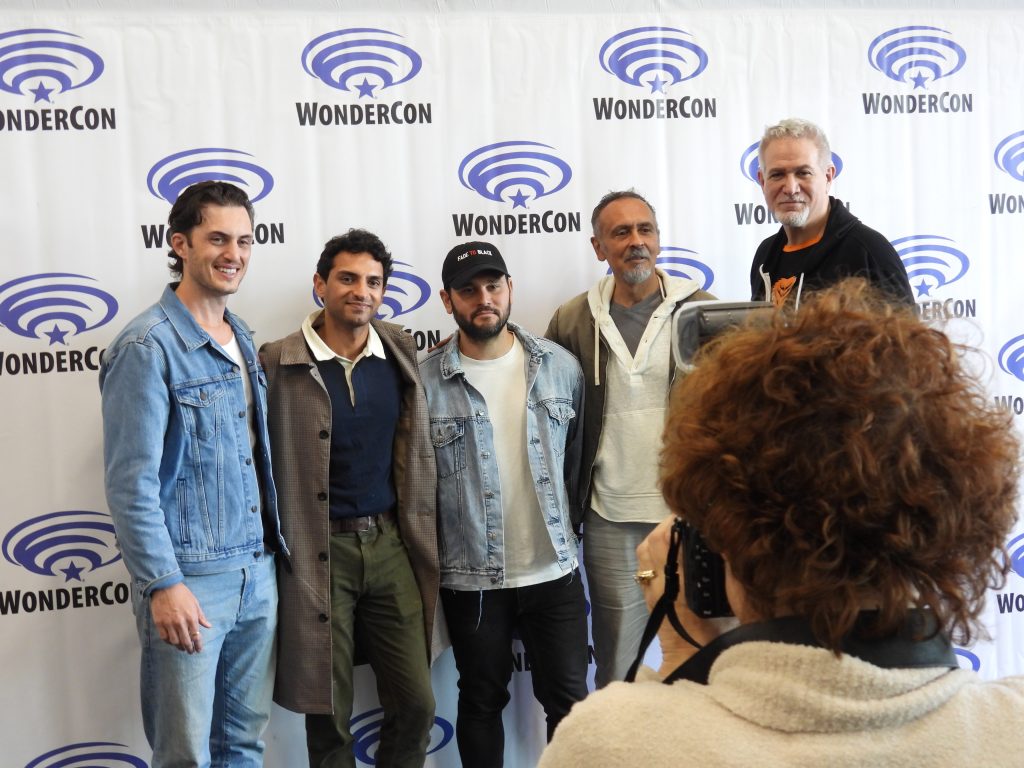
Full disclosure: I am an investor in Legion M, giving $250 in 2022 to help support the film Nandor Fodor and the Talking Mongoose, although I have not put any money into the project discussed below.
–
How far would you go to get a movie made in Hollywood? That is the basic plot behind the upcoming thriller Fade to Black. The cast and crew were at WonderCon promoting one of Legion M’s latest projects and participated in a roundtable interview.
Our first interview was with actor Bernard White, who jokingly admitted he forgot what character he played and should’ve re-read the script. He plays Gurpreet, the father of the writer Amit (Karan Soni). “So, this is what I know from my point of view of the film,” he said. “I play the dad who’s subsidized his son’s entire time in Hollywood to try to become successful. At the ten-year anniversary, I’m going to cut him off if he’s not successful. That’s where we’re at as the film opens, and there’s a whole secret he has that I have no idea what he’s doing. I don’t know what I can spoil or can’t give away.”
I asked him what drew him to the part. “It explores the dark side of Hollywood,” White said. “It asks this question of how far are you willing to come to fulfill your dream? And it shows the horrible things people might do to make it in Hollywood. It’s a film in the vein of The Player by Robert Altman or The Studio. It explores the inside from a writer’s point of view.”
He went on. “The thing that I watched to research was The Day of the Locust: that’s kind of the world it lives in, the seedy weird side of Hollywood. It’s a beautiful film. I will say that the script is another thing that drew me to it.”
For those unaware, Legion M is geared toward a collaborative approach, stylizing themselves as a fan-owned production company and does a lot of crowdfunding. With that in mind, White was asked whether working with them was any different than a traditional studio. “No. I love the idea of it,” he said. “I love that it feels like old-time community theatre or something.”
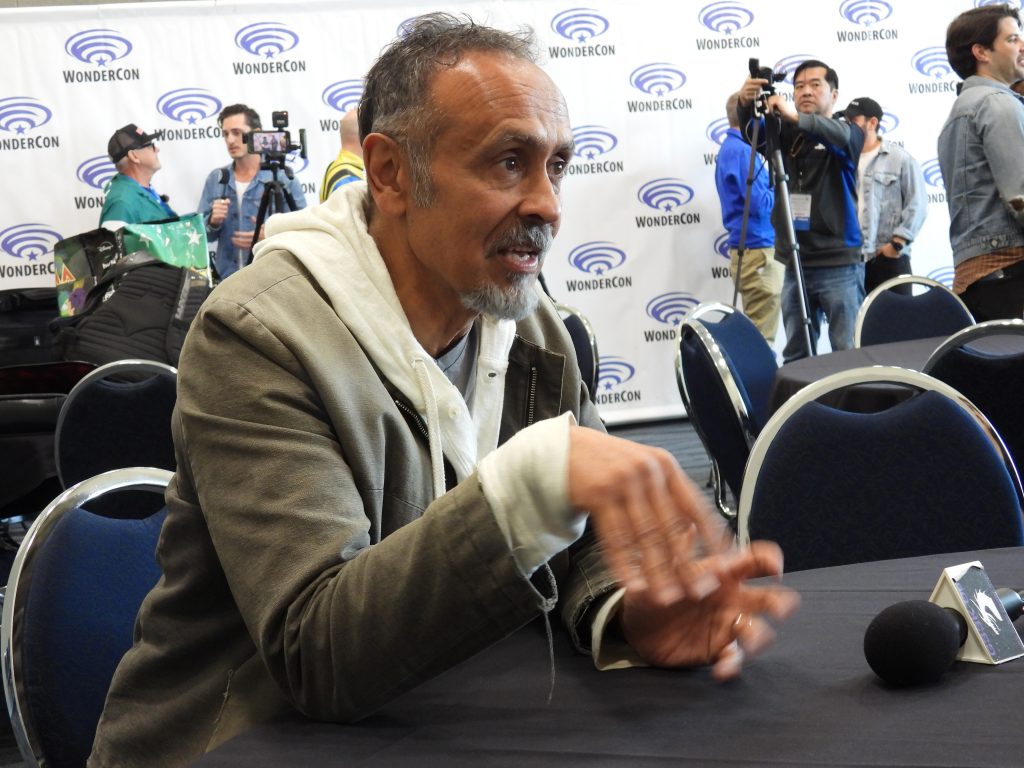
I asked about his process as an actor. How does he approach a role? “First thing I do is I read the script,” he said with a laugh, referencing his earlier statement. “I should’ve re-read it, because it’s been five months since we shot, and I’ve done seven things since that. Then I find music that fits the character. I work with a dream coach. I give myself a dream assignment at night, I’ll go to bed, and I’ll say, ‘Dear God,’ or ‘Dear inner self, please bring me a dream that will guide me as I play this character.’ And then whatever comes of that dream, I will write it down. I believe that every role, even if it’s a small role, comes to me to heal my life.”
He continued, “Then I’ll just get hints. My character loves model cars. So, one thing I did for this world was I started making model cars again. What this did is it took me back to Detroit. I grew up in Detroit, and when I was young, I used to draw cars. Then I had to put together a car on set in one of the scenes. I did this elaborate car that I thought was perfect for the role, and it was a 1968 red Camaro, which my sister had. I put together this car in preparation for this role and then showed up on set with it almost finished, because I thought, ‘Oh, I can continue to work.’ But then on the day, we were running late. They didn’t use it. They didn’t use my car, and it killed me. It became this symbol for me of lack of control. I now carry this car to every audition because it tells me to follow through and stick up for myself.”
I asked him what he does to keep from getting burned out. “In the downtime?” he clarified. “I wake up every Sunday morning at 7 am and I perform T.S. Eliot’s ‘The Four Quartets’ in Griffith Park. I’ll do things like that: I’ll pick some big things to memorize. This is like a 60-page poem and I’ll memorize it and perform it wherever I can. And I do a lot of theatre in New York.”
The next interview was with David Baxter, one of the Legion M executives and one of the producers of Fade to Black. “It’s very exciting to be able to talk about a film a little bit, because we just completed production,” he said with a smile. “This is the phase where it all comes together, where you have the script, which is a blueprint, and then there is the finished product, which can sometimes be significantly different. But hopefully, it’s always sort of pushing it up and making the material rise to the occasion.”
He was asked what he could say about the film. “The movie is part thriller, part horror, part social satire—specifically about Hollywood. The lead character is a screenwriter. Right now, just as you guys should know, original material is very difficult to get made because the studio system has changed. It used to be producers would make a decision based on an idea, whatever they wanted to do, or they would go to a great writer and buy a spec script. Nowadays, it’s become very important for whatever you’re doing to be based on something else. So, whether that be a comic book, whether that be an article, whether that be a famous book: the studios want to mitigate risk. If something has been successful before, they figure it could be successful again. And what they’re trying to do is always target a particular audience. We’re a small production company, but we’re always seeking to find genre movies that are elevated in some way.”
He continued, “I’m a member of the Writers Guild. This script is a blacklist script, which is a place where you can get very high level well-written things. When I read the script by Brandon Cohen, I literally would have flopped sweat from reading because the interactions of the lead character of the writer with executives—they were actual conversations that I heard as a writer. So, the question that this movie asks is what are you willing to do to get your movie made? Our character is a horror writer. I can’t go into any detail, but we have the greatest star in the world for this particular role, Karan Soni, who stole every scene he had with Ryan Reynolds in Deadpool. He has this natural lovability: this is the last person you could imagine doing unsavory things, and he was absolutely flawless. I think he’s in pretty much every single scene in the film. He lifts this all on his shoulders.”
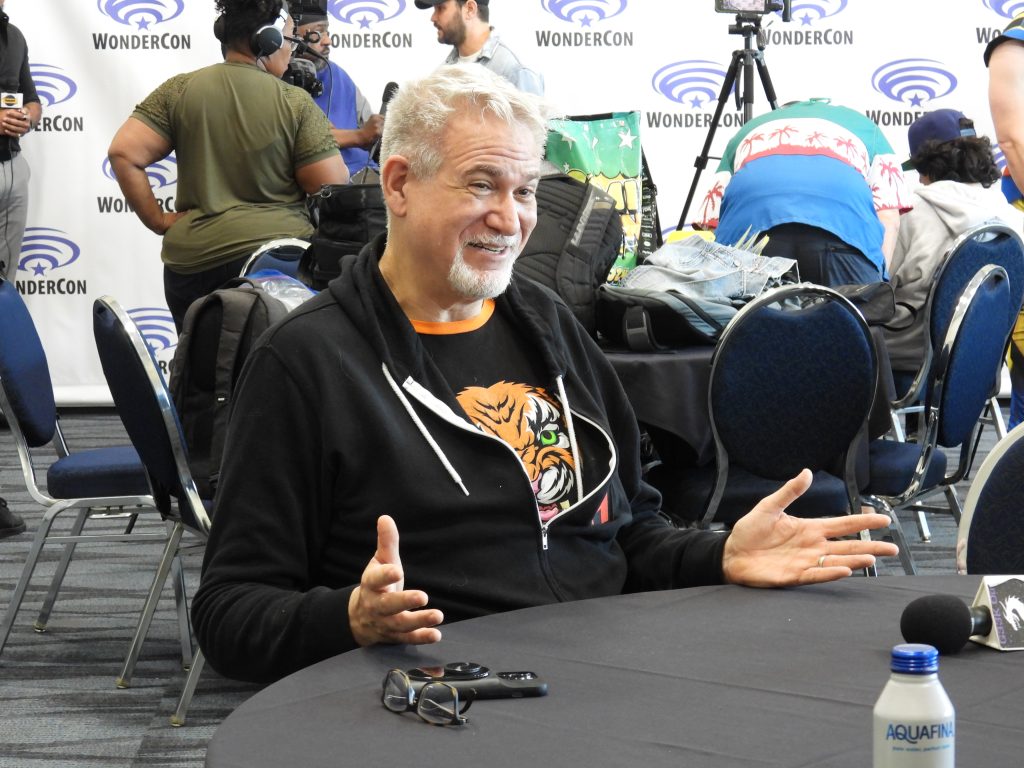
One of the other journalists followed up on Baxter’s comments about how everything now is based on something else and asked him to expand on that. “It’s risk management,” he said. “The studios want a fiduciary duty to their shareholders. So, what they’re going to look for are things that they think are sure things. What they’re finding out is that even Marvel movies aren’t sure things.”
He continued, “There’s a thing called habituation that occurs if we see things over and over, if the audience ever feels like they’re being treated as just a money machine. There has to be some kind of heart behind all of these things, which is why you need great writers and great directors. Obviously, writers are under fire because of AI: AI is literally scrubbing the internet, reading all these screenplays, and so hopefully, the best writers will find ways of working with AI. It’s not going away. The question is, how do you professionally integrate and use it as a tool to help move things along but not to take over? There are some jokes in the film about AI. It’s a little teaser.”
I asked whether Legion M’s setup made it easier or harder to get things made. “We started Legion M because we felt there were certain movies that the studios weren’t making,” Baxter said. “But our job is to talk and communicate with the community of filmgoers and ask them what they want to see. Then we need to find incredibly talented people and let them make the movies that they want to do. Our director, Andrew Sandler, is at the height of his game with music videos. This was his opportunity to make his first feature film and he’s assembled an incredible cast and did a great job.”
He continued, “So to answer your question, it’s never easy to make a movie. You never know what’s going to happen. Timing has a lot to do with it. It’s one of those businesses where you can’t control all of the different factors. I guess that’s one of the things that makes it exciting. The watchword in all of this that makes us different from the studios is we have a community of like-minded people who love film and television , and they’re willing to tell us what they want. I mean, art is not made by committee, but having the opinions of 45,000 investors, 250,000 in our community, that’s a statistically significant number. That’s like taking a cross-section not just of the country, but of the world. We found that it statistically links up to Rotten Tomatoes: it’s like we have our own Rotten Tomatoes, and we’re able to ask these people ahead of time to help us guide our decision-making. We’re a very small company, so we depend on our community. We think the community really enjoys it, because it’s a chance to pull the curtain back whenever we can.”
What about shooting in Hollywood? “We felt it was important to shoot Fade to Black in Hollywood, because it’s a character. It’s been so long since there has been a sendup of Hollywood. The Player came out in the ‘90s, and then there’s Entourage, but there hasn’t been anything like this until actually a couple of days ago: The Studio came out on Apple+, and it seems to be a runaway hit. We’re thrilled because what it means is that people kind of want to make fun of Hollywood. The point is: we have to fight for independent film for different people’s voices. Studios can’t do that. They’re not in a position to do that. They have to make movies that are going to please their shareholders. We think we’re kind of an answer to that.”
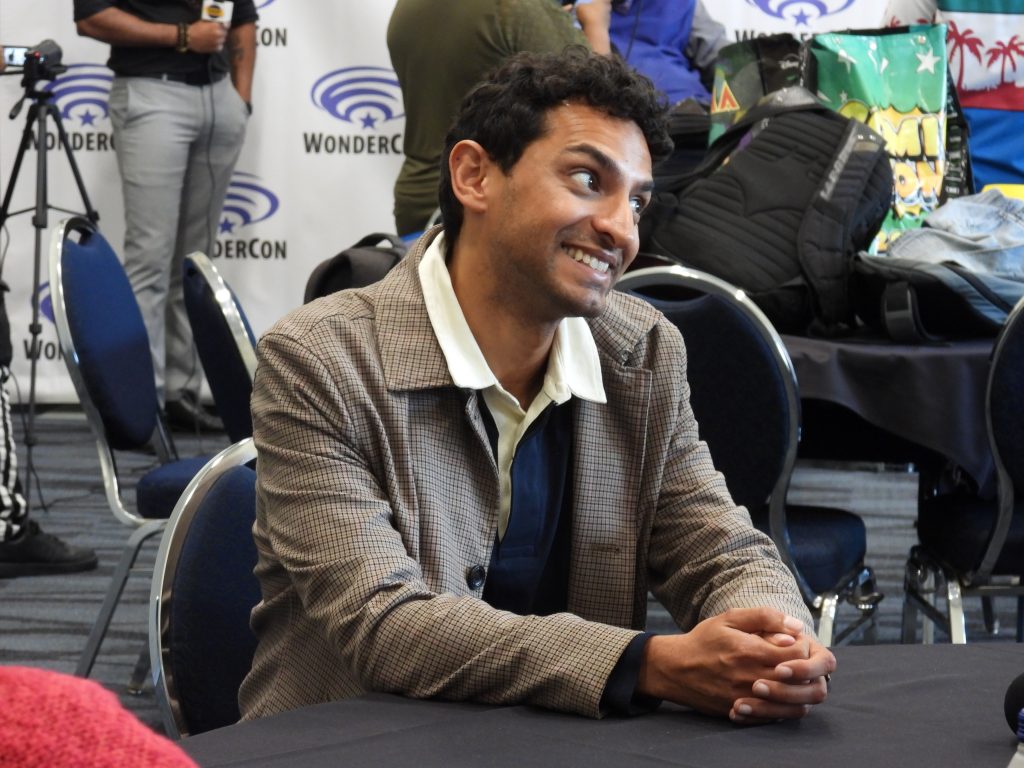
Our next interview was with actor Karan Soni. What drew him to the project? “The script was amazing. I had never played a part like this before. It’s basically a struggling screenwriter who’s trying to make it in Hollywood, is trying to make his first movie, and he’s frustrated by the system. Eventually, he snaps and starts killing agents and executives and becomes a serial killer. So, something very unusual and very interesting. It’s like a social satire/thriller on the state of Hollywood.”
We asked for more specifics. “What was really cool about it is the arc. By the end of the script: I remember reading it the first time and this person has killed multiple people, but at the end I still want him to win, which is this very hard thing to do in writing. The ultimate version of it is Breaking Bad, where you’re meeting this character and over a long time he’s doing horrible things, but we still want him to win at the end and not be punished. In a movie, obviously we have less time, but that was the challenge. He does really bad things that are unacceptable, but at the same time I really felt for him in the reading of it. I hope in the performance people feel that, too.”
One of the other journalists asked what he brought of himself to the role. “I am very bad at expressing rage and anger, and I live in LA and I drive in LA. Early on, I got in an accident like many years ago, and the tow truck driver said to me, ‘Never do any road rage, because I’ve seen brains on the top of cars.’ And so I have so much of this unexpressed emotion that in this movie I just got to get it all out. People were like, ‘You’re sweet,’ and then when they saw me do those scenes, they were like, ‘Are you okay?’ But it was really fun for me, and it was cool to be covered in blood and do all that kind of stuff.”
Since he’s best known for his role in the Deadpool franchise, I asked him if he felt it was easier to do comedy or drama or were they just different? “I think comedy can be a little bit harder,” he said, “because sometimes you just want a good story, and sometimes in comedy, people get distracted. There’s just good jokes, but the story isn’t good. Like Bridesmaids, for example, had a great story engine and you really care for Kristin Wiig, and then it’s surrounded by all these scenes. But a lot of times, comedies don’t focus in on the development of the story as much: it’s more just set pieces. So, it can be harder in terms of, like, this scene doesn’t have anything but jokes and there’s no story in it. In drama, usually you need to have a story because there’s not jokes loading it. It ultimately just depends on the writing. But nothing is more fun than doing comedy, because then you’re just getting to go and kind of have a good time, and if you’re having fun, that means you did a good job, which is nice.”
He was then asked about how playing a serial killer played into the satire of the film. “It was in the writing, which I think is the right way to do it. The people around me are very funny, but they’re also very grounded, because all the agents and executives, the way they speak in Hollywood is kind of alien and insane. The terminology, the stuff they say, and the bubble that they’re in. A lot of the actors around me were great character actors, and they basically play slightly heightened versions of what a real agent would say and what a real executive would say, and then I’m sort of the straight person who’s sort of just at the receiving end of that. I was more of the normal person and I’m surrounded by all these goofs who are kind of more extreme.”
I, of course, asked him what his process was. “A very basic process that has worked so far. Thirty days before the movie starts, I read the script every day once. And in terms of that, what ends up happening for me is 1) the lines get memorized, and 2) I’ll just constantly have ideas and I’ll scribble them on the script pages. Sometimes it’s improv. Sometimes I will have an image when I’m reading it one day for the 50th time or something, and I’ll look at the script on the day and be like, ‘Oh, that day I had that idea.’ It’s just something that happens.”
He continued, “And then I don’t like to rehearse or do anything. I think it’s sacred to capture something on camera for the first time. If the director is like, ‘Do you want to run the scene?’, I’m like, ‘No.’ And then I do think some magic happens on its own. Then over time, I’ve learned not to control the creative process for myself. I do think acting is just on the day. If it comes from above, it comes from above. The end of this movie is very intense. We shot it over 14 hours. I honestly was like, ‘I don’t know if I could do this, but I’m just gonna trust that I’ve done everything. And if it comes today, it comes, and if it doesn’t, it’s fine and not to try to be precious or control the creative thing. So it’s a mix of super preparation, but then also surrendering to whatever is going to happen.”
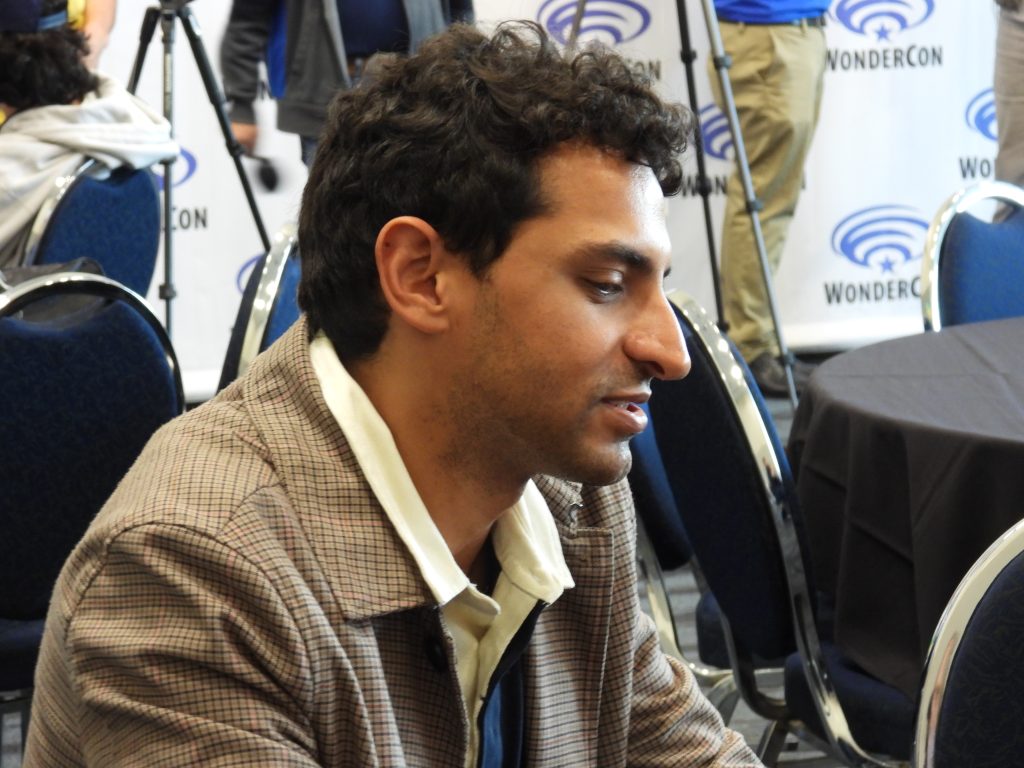
One of the other journalists asked if he based his performance on a real serial killer. “No, because I don’t like watching that stuff,” he said with a laugh. “But what was really interesting about it that was very cool: we had a great stunt person. She essentially was like, ‘I’m reading the script, and I feel like the stunts and the kills should not be professional, because this is a writer. What would it feel like for a writer to take a knife and put it into someone? How would they do it?’ And so those kills were like very sloppy, and I’m missing a lot, and hopefully as you’re watching you’re like, ‘Oh, my God, it’s almost hard to watch because he’s not good at it.’ That was really fun in the choreography of the stunts: I’m getting beat up as I’m trying to kill people. I’m not succeeding a lot.”
He was then asked what it was like filming this actually in Hollywood where he lives. “It was really fun,” he said. “It’s a side of LA that does not make LA look appealing, and that is actually the way LA feels—at least to me when I started in Hollywood with no connections. It’s not glamorous. You only see dirt and the ugliness of it all. And that’s what the world of the movie is. So even in the stuff I’ve seen, LA looks like of bad and not safe, and because we’re in the main character’s POV, it’s a dog-eat-dog world and everyone is trying to get ahead. It was a really interestingly heightened lens into that world. The entire conversation is about the Hollywood system now.”
He continued, “My character’s written an original script, but every Hollywood executive is like, ‘We need IP.’ What ends up happening is I accidentally kill the first person, and I realize this could become IP because it will be a news story. So, I option the news story from the crime scene, and then I go back out, and then I realize the news story is dying, so I have to keep killing people to keep the IP alive. The movie will ultimately ask the question of how far you would go to make your dream come true.”
He was then asked whether he connected to someone on the set in real life. “Morgan, I would say: she was my makeup person. I have a lot of blood and a lot of scars, so I did have a lot of time sometimes in the makeup chair. And we shot all nights and it was like a long shoot and I was in every scene. Many scenes, sometimes I’m alone, so she was like the only crew member I was really interacting with all the time. All of her work is amazing in the movie, because sometimes I would see how bad the bruises were, and I was like, ‘I don’t even have to act because I look so rough.’ It was doing all the work, so it was kind of nice. But the artistry of all those people really shined in this, because all the prosthetics and blood. We had a special blood guy who made his own blood which is cleaner, comes off easier. You don’t even need soap, and it smells like maple syrup. When you’re covered in it, you’re like, ‘I love this blood. The consistency is great.’ These are the conversations we were having on this movie. But I loved all that, because that’s the fun part. Before I entered Hollywood, you don’t realize how many crafts people work on the other side, and often your performance is helped by the work of all these people. There were so many different technicians who are making the movie with their work.”
While I had him, I had to ask him about his new movie A Nice Indian Boy. I had just seen the trailer a few days prior to the interview and loved the concept (he is in a relationship with a character played by Jonathan Groff, and it’s about Soni’s character bringing him home to meet the family and it looks friggin’ adorable).
“It’s adapted from a play of the same name that was first put up in 2014, and we’ve modernized it for the screen. It’s not a coming out story, but it’s this other part of coming out which is cool that we’re exploring now which is introducing someone you’re in love with to your parents, and ask the question: they accept you in private, but will they accept you in public? That’s been a very emotional thing. We premiered at South by Southwest and we’ve played at over 20 festivals before coming out now. It’s been really cathartic and emotional, because a lot of it connects the parents a lot and a lot of people have watched the movie with their parents, and it’s a movie that really brings people together in a very sweet way. It’s a movie I wish I had 10 years ago to show my parents, but it exists now, so that’s cool.”
He continued, “The other thing with the movie is that it’s about an interracial relationship. And when we were pitching the movie to financiers to get money, we interviewed straight, gay, all kinds of couples where we’re like, ‘Here’s a strong culture, here’s a strong culture: how do you do the wedding part of the movie?’ Because it’s the conflict of all that stuff that comes up for people, and often you have to win a more dominant cultural family.”
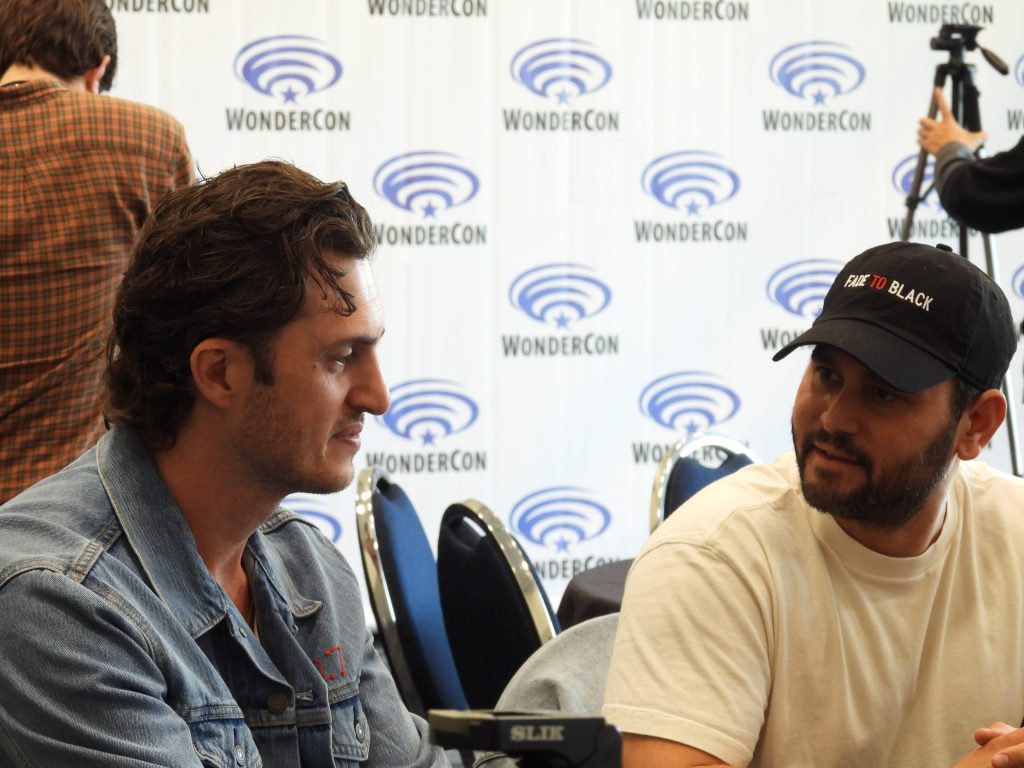
Finally, we talked to producer Dannie Hamouie and director Andrew Sandler together. We asked them the same thing we asked the others: what drew them to the script?
“When I first read the script, I had so much fun reading it,” Sandler said. “It was just such an insanely fun wild ride. And [it was] something I could really relate to about someone trying to break through in the industry. That relatability is what made me really excited about wanting to make it.”
“Brandon has such a distinct voice and perspective on the industry that it was hilarious,” Hamouie added. “I had been trying to find a script for a friend of mine who was becoming like a proper leading man, and I couldn’t. I had read about 100 scripts, and nothing was quite the fit. This was the last batch of scripts before I just gave up on everything. Then I read it, and I immediately called my producing partner, and I was like, ‘Oh, this writer has something within the first 15 to 20 pages of reading it.’ So he’s just got such a hilarious twisted way of describing everything.”
They were then asked how they balanced the idea of a serial killer that looks very charming?
“It wasn’t an easy thing to do,” Sandler said, “but when you bring someone like Karan to the table, who already brings that kind of levity and who brings that comedy, and then you balance that with a tone that’s a little more dark, we found this kind of middle place that straddles the line between darkness and humor.”
“Just echoing what Andrew said,” Hamouie added. “Karan is such a comedic genius: the script at times is a little darker, so his natural inclination to make things just a little bit funnier really made the whole performance sing.”
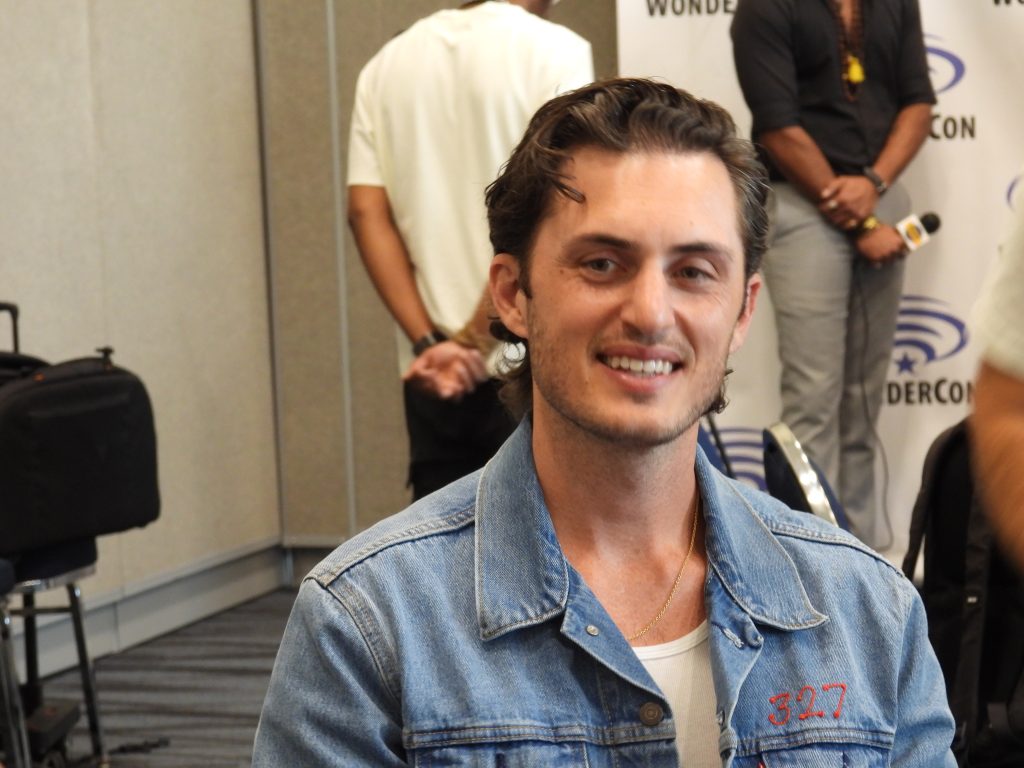
Next up was asking about some of the challenges they faced. “I an just speak from the producing perspective,” Hamouie said. “Everybody told me no. They’re like, ‘it’s too inside baseball, it’s too small. We’re not going to shoot in LA. No one wants to hear this story.’ And then turn around and The Studio is the most popular show right now. I didn’t want to listen to what anybody was saying. Eventually, I got introduced to Legion M, and they saw the vision just like I did. They thought it was hilarious. That was probably the most challenging thing: I just knew we had something, and I just wasn’t going to give up until it was made. It was just about finding the right partner.”
“For me, the most challenging part was the timeline which we had to shoot,” Sandler said. “It was an independent film through and through, and everybody who showed up was there because they loved the material. They wanted to work with Karan or they saw something in the team, in the film, that they wanted to be a part of. But the challenging part of that is like, you have so many amazing talents in the room: how do we accomplish this in a short period of time?”
I asked the same question as to whether working with Legion M was any different from working with a more traditional studio. “It feels more like a family with them,” Hamouie said, “and they’re really thinking about all their investors and fans and what they want to see. It’s a really cool business model, because it doesn’t feel so cold and sharp like a lot of these other companies. I mean, they’re sharks, and it can really sour your taste with how the whole process of the project can go. This industry can be so dark and daunting at times, but having really collaborative partners that bring in a community that wants to support you and support original ideas and voices is something that I hope I have more projects with them.”
“From my side, from the directing side, it was great to know that you have a team who really believes in the vision of it,” Sandler said. “Knowing that there’s a community of fans who voted for this project, who are supporting it when you’re on the set making the movie: to know you have that kind of support behind you from so many people who are excited, it just made it for me a more rewarding experience.”
What was their favorite moment on set?
“I think the one that kind of sticks out to me is our first day on set,” Hamouie said. “This is actually happening. We were a small scrappy film, but we walked on set and I was like, ‘Oh, this looks like a $20 million movie. Oh, my God: we’re actually doing this.’ It didn’t feel real until all of a sudden it got really real.”
“I agree,” Sandler continued. “For me, it was the first take that we rolled with Karan. We didn’t have the luxury of getting any rehearsals for this movie. Because of the level of talent we brought in, we’re trying to fit this in between shows they’re on, other movies they’re working on. So, there was never any rehearsal. So literally the first time we rolled the take was the first time we saw Karan and Rafael Casal in those characters. The second Karan gave his first couple of lines, I just had chills … chills on my arm right now, yeah? Just seeing him embody the role, because I had no idea what we were in store for.”
“Building on what Andrew was saying,” Hamouie said, “we’d obviously had discussions, but pre-production was just making sure we had every location locked down. There was no time for rehearsal, so in that sense, we’re hoping that all the actors are going to come prepared and ready because we were kind of flying blind. We don’t know what we were going to get, and then everybody showed up.”
“We got really lucky, and we captured lightning in the bottle,” Sandler finished.
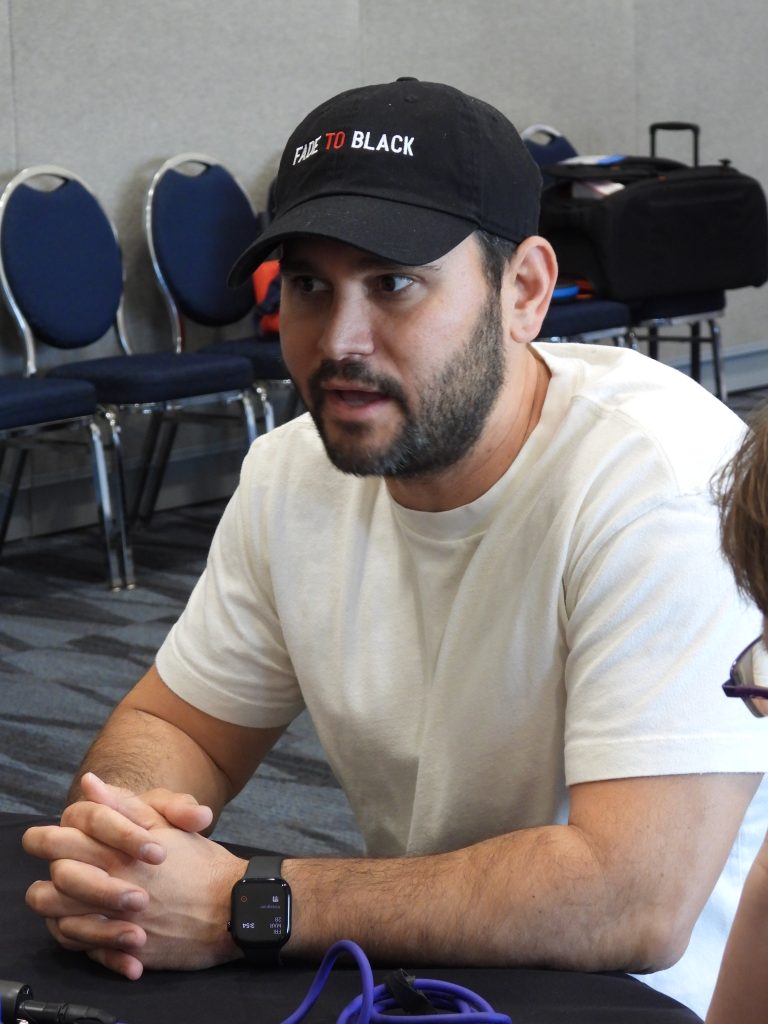
They were asked what it was like filming in Los Angeles: navigating everything and making sure they got everything in the time allotted. “It was definitely challenging,” Hamouie said. “LA’s providing a lot of challenges for independent filmmakers right now, but LA is a character in the story. It was like, you’re not going to shoot Top Gun without Tom Cruise. So, we’re like, ‘If we’re not going to shoot in LA, then we’re not going to make the movie.’ The challenges that presented themselves, I think, were offset by a lot of the cast that we got that were like, ‘Yeah, I’ll give you a couple of days, because you’re like in my backyard. I don’t have to go to Oregon or New Mexico and leave my family.’ So, it kind of balanced each other out.”
Finally, I asked what they hope audiences will get from the movie. “I think everybody who’s ever done and gone after a dream has kind of ‘how far are you willing to make it and at what point do you cross the line?’” Hamouie said. “This film toes the line of self-confidence and desperation, and hopefully anybody that’s going to pursue anything in this creative or entrepreneurial endeavor will just think twice about how far are you willing to go? Is it worth it? It provides a lot of questions that someone’s going to watch and not only enjoy but ask themselves, like ‘Is this what I want to do?’ And then laugh at themselves a little bit, because we’re making a movie. It’s fun, you know. I think a lot of people in Hollywood take themselves so seriously. We’re holding a mirror up to the industry.”
–
There is no release date yet on Fade to Black, but the team hopes to get it on the festival circuit soon.
However, you can find out a little more on their official website. See all my WonderCon 2025 coverage here, and see all my photos (including more from this roundtable) on my Flickr.
Author: Angie Fiedler Sutton
Angie Fiedler Sutton is a writer, podcaster, and all-round fangirl geek. She has been published in Den of Geek, Stage Directions, LA Weekly, The Mary Sue, and others.
She also produces her own podcast, Contents May Vary, where she interviews geeky people about geeky things. You can see all her work (and social media channels) at angiefsutton.com.
Help support independent journalism. Subscribe to our Patreon.
Copyright © The Geekiary
Do not copy our content in whole to other websites. If you are reading this anywhere besides TheGeekiary.com, it has been stolen.Read our




